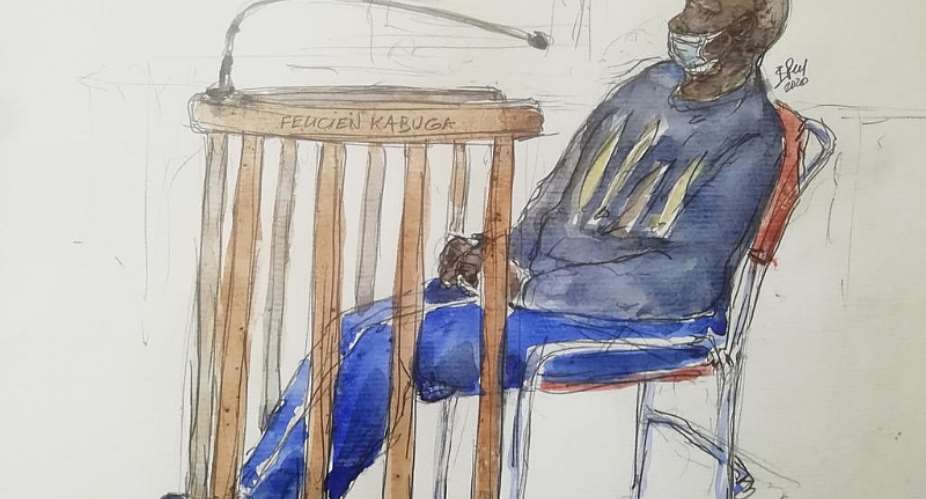Rwandans in France have welcomed a ruling by the country's top appeals court to extradite the alleged financier of the Rwandan genocide, Félicien Kabuga, to Tanzania to stand trial. Kabuga, who was arrested in May after 25 years on the run, had asked to face justice in Paris.
"After all the dramatic twists, this is incredibly good news," Richard Gisagara, a lawyer in Paris and a member of the French Rwandan Community association (CRF) told RFI by phone on Wednesday.
Gisagara was reacting to news by France's top appeals court to transfer the man who allegedly bankrolled the Rwandan genocide to a UN court in Tanzania.
Félicien Kabuga is to be tried on charges of genocide and crimes against humanity for allegedly funnelling money to militia groups as chairman of the national defence fund.
He is also accused of setting up the Interahamwe militia that carried out massacres as well as the Radio-Television Libre des Mille Collines whose broadcasts incited people to murder. He denies all the charges.
End of impunity
"This decision marks the beginning of the end for impunity," Gisagara continues, deploring the fact that it has taken more than 25 years to bring Kabuga to justice.
The suspect, once one of Rwanda's richest men, was arrested near Paris in May after evading the law for over two decades.
During a court appearance in May, he described the accusations against him as "lies".
His lawyers argued that the suspect in his late 80s was too frail to be sent to face trial at a UN tribunal in the Tanzanian city of Arusha.
But the judges disagreed. France now has one month to hand Kabuga over to the Mechanism for International Criminal Tribunals (MICT), which took over from the UN's International Criminal Tribunal for Rwanda (ICTR) when it closed in 2015.
Limits of international justice
However, Gisagara is wary about the outcome.
"The international justice system has two imperfections: first, victims are not treated as civil parties but are only called in as witnesses, if they're called in at all," he says.
Some 800,000 people were killed in the 1994 genocide by Hutu extremists and survivors are still struggling to rebuild.
"The longer justice takes to be served, the more difficult this process becomes," explains the lawyer.
"It took the ICTR a ridiculous amount of time, we hope the MCIT will be quicker," he comments referring to Kabuga's advanced age.
"It would be a shame for him to leave this world without being judged by humanity."





 Lay KPMG audit report on SML-GRA contract before Parliament – Isaac Adongo tells...
Lay KPMG audit report on SML-GRA contract before Parliament – Isaac Adongo tells...
 Supervisor remanded for stabbing businessman with broken bottle and screwdriver
Supervisor remanded for stabbing businessman with broken bottle and screwdriver
 NDC watching EC and NPP closely on Returning Officer recruitment — Omane Boamah
NDC watching EC and NPP closely on Returning Officer recruitment — Omane Boamah
 Your decision to contest for president again is pathetic – Annoh-Dompreh blasts ...
Your decision to contest for president again is pathetic – Annoh-Dompreh blasts ...
 Election 2024: Security agencies ready to keep peace and secure the country — IG...
Election 2024: Security agencies ready to keep peace and secure the country — IG...
 People no longer place value in public basic schools; new uniforms, painting wil...
People no longer place value in public basic schools; new uniforms, painting wil...
 'Comedian' Paul Adom Otchere needs help – Sulemana Braimah
'Comedian' Paul Adom Otchere needs help – Sulemana Braimah
 Ejisu by-election: Only 33% of voters can be swayed by inducement — Global InfoA...
Ejisu by-election: Only 33% of voters can be swayed by inducement — Global InfoA...
 Minority will expose the beneficial owners of SML, recover funds paid to company...
Minority will expose the beneficial owners of SML, recover funds paid to company...
 Prof. Opoku-Agyemang has ‘decapitated’ the NPP’s strategies; don’t take them ser...
Prof. Opoku-Agyemang has ‘decapitated’ the NPP’s strategies; don’t take them ser...
